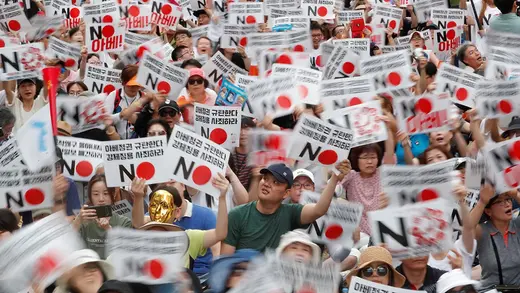
The global tech industry and U.S. interests in Asia could suffer if the dispute isn’t resolved soon.
Japan and South Korea are showing no signs of backing down from a trade dispute that could disrupt global production of smartphones, computers, and other electronics. The recent flare-up, rooted in historical disagreements, marks a deterioration in the relationship between two important U.S. allies.
Last month, Japan placed export restrictions on chemicals and other materials that South Korea’s tech industry needs to produce semiconductors and smartphone screens. Japanese officials claimed that the materials had been illegally sent to North Korea, where they could be used to make weapons.
Japan added more restrictions on Friday. Officials announced that they would remove South Korea from their list of trusted trade partners, making it harder for Japanese companies to sell to South Korean buyers. The decision won’t go into effect for twenty-one days.
Japan produces almost all of the world’s supply of three materials—fluorinated polyimides, photoresists, and hydrogen fluoride—that South Korean tech giants Samsung, LG, and SK Hynix rely on. Japanese exporters will now have to get permission before sending the materials to South Korea, a process that takes about ninety days.
Experts estimate that these companies have one to three months of stockpiled materials. If the trade dispute lingers, the global tech industry could feel the sting, since South Korean companies produce more than half of the world’s semiconductors and more than 90 percent of smartphone screens.
More From Our ExpertsSeoul hasn’t retaliated yet, but President Moon Jae-in warned tech companies to prepare for a prolonged trade dispute and encouraged them to develop the capability to produce the restricted materials. South Korean consumers have boycotted Japanese goods, including clothes and beer.

There are also worries that the spat could upend security cooperation in the Pacific between Japan, South Korea, and the United States. Last week, South Korean officials threatened to revoke an intelligence-sharing agreement with Japan that experts say is crucial to dealing with North Korea.
The current tensions stem from lingering anger over Japan’s occupation of the Korean Peninsula in the lead-up to World War II. During that time, thousands of so-called comfort women were forced into sexual slavery and thousands more people were coerced to work without pay. Last year, a South Korean court ruled that Japanese companies must compensate Korean workers for forced labor during the war. Japan rejects the ruling, arguing that the reparations issue was resolved in 1965, when the two countries normalized relations.
But, as CFR’s Sheila A. Smith points out, the deterioration of Japan-South Korea relations in recent months is about more than historical grievances. They disagree on how to handle regional flash points. On North Korea, for example, Moon supports easing sanctions, while Japanese Prime Minister Shinzo Abe insists on maintaining a tough response. South Korea sees an opportunity for warmer relations with China, whereas Japan sees China as a competitor.
Tensions between Seoul and Tokyo flared again in late July, when Russian warplanes entered the airspace above islands that South Korea controls but Japan claims. When the South Korean military responded with warning shots, Japan denounced them as “totally unacceptable.”
The United States could work as a mediator. President Donald J. Trump has already offered to help, and Secretary of State Mike Pompeo tried unsuccessfully to ease tensions during a trilateral meeting. But Washington has been reluctant in the past to get involved in historically motivated disputes between the two allies. Still, U.S. officials worry that the dispute could lead to a weaker front against North Korea and China.
“The United States’ strategy in Asia depends on trilateral cooperation with Japan and South Korea,” write Celeste L. Arrington and Andrew Yeo in Foreign Affairs. “It should make resolving the conflict between its allies a priority.”
Meanwhile, South Korea is trying to rally international support. It has lodged a complaint at the World Trade Organization and lobbied fellow members of the Association of Southeast Asian Nations, but so far few other countries seem eager to get involved.